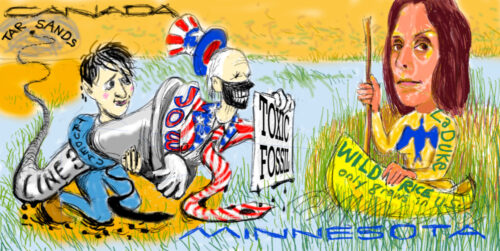Biden Cancelled Keystone XL, Will Line 3 Be Next?
By Tim Hill
With the Keystone XL pipeline project shut down for good earlier this year, many on the left felt a sense of relief after the relentless fossil fuel exploitation projects pursued by Donald Trump would come to a close. President Joe Biden’s win signaled an era of reform against the fossil fuel industry and was initially touted as taking on the biggest corporate polluters. If this is the case, then what about the Enbridge Line 3 pipeline in northern Minnesota?
To members of the Anishinaabe Nation, who have inhabited this land for millennia, Biden continues to ignore their demands for clean water, clean air, and the right to exist in a non-polluted, non-corporate-owned environment. They have endured multiple oil spills on their land from this pipeline, first in 1991 and then again a decade later in 2001. That’s just in recent memory.
Indigenous activist and attorney Tara Houska has been at the forefront of resistance against Enbridge Energy, which is being championed on the Canadian side by Justin Trudeau, who has faced significant criticism from climate activists for some time now for his neoliberal pro-fossil fuel policies and his refusal to denounce the pipeline as well as tar sands extraction in the boreal forests of northern Alberta. Biden, who obviously is in close allyship with Trudeau, is walking a fine line between continuing to ban fossil fuel projects and work with Republicans that are pro-fossil fuel energy.

I personally feel that Biden’s indecisive attitude may potentially be his biggest downfall. While he certainly is doing more than I would have expected him to do on climate issues, the human rights abuses of fossil fuel companies leave little room for half measures and pats on the back.
Over the last few months, the Enbridge Line 3 pipeline has continued to garner significant media attention from mainstream, independent, and alternative publications. While it hasn’t had the frenzied coverage that the Dakota Access Pipeline had when bloody attack dogs were bestowed upon indigenous inhabitants, (or water protectors, as they called themselves), it shouldn’t take such an action for the public to stand up and take notice and realize that now might be the time for them to act.
For Houska, this sort of fight is about survival and preservation of culture, environment, wildlife, and human rights. It’s about grappling with the reality that genocide and destruction are the real cancer, the real virus that plagues and has always plagued indigenous folx since colonization.
